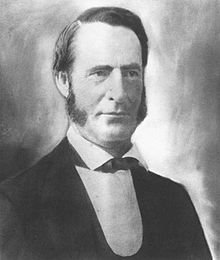Charles Coffin Harris
| Charles Coffin Harris | |
|---|---|
 |
|
| Attorney General of The Kingdom of Hawaiʻi | |
|
In office August 26, 1862 – December 21, 1865 |
|
| Monarch | Kamehameha IV |
| Succeeded by | Stephen Henry Phillips |
| Minister of Finance of The Kingdom of Hawaiʻi | |
|
In office December 21, 1865 – December 21, 1869 |
|
| Preceded by | Charles de Varigny |
| Succeeded by | John Mott-Smith |
| Minister of Foreign Affairs of The Kingdom of Hawaiʻi | |
|
In office December 21, 1869 – August 25, 1872 |
|
| Preceded by | Charles de Varigny |
| Succeeded by | Ferdinand W. Hutchison |
| Chief Justice of the Supreme Court of The Kingdom of Hawaiʻi | |
|
In office February 1, 1877 – July 2, 1881 |
|
| Monarch | Kalākaua |
| Preceded by | Elisha Hunt Allen |
| Succeeded by | Albert Francis Judd |
| Personal details | |
| Born |
June 9, 1822 Newington, New Hampshire, United States |
| Died | July 2, 1881 (aged 59) Honolulu, Oahu |
| Resting place | Oahu Cemetery |
| Nationality | Kingdom of Hawaii |
| Children | 2 |
| Alma mater | Harvard |
| Occupation | Lawyer, Diplomat |
Charles Coffin Harris (1822–1881) was a New England lawyer who became a politician and judge in the Kingdom of Hawaii who firmly supported the monarchy as an independent nation. After serving in a number of cabinet posts, he became chief justice of the supreme court.
Charles Coffin Harris was born June 9, 1822 in Newington, New Hampshire. His father was educator William Coffin Harris (1788–1853) and mother was Mary Johnson. After studying in his father's school in Portsmouth, New Hampshire, he enrolled at Harvard in 1837 and graduated in 1841 when only 19 years old. He taught school for a few years in Portsmouth.
On January 31, 1844 Harris married cousin Harriet Miller Harris, and in 1847 moved to Boston to teach at the Chauncey Hall School while studying law. In 1849 he and two brothers Thomas and Abel sailed to join the California Gold Rush. On a trip to the Hawaiian Islands to obtain produce to sell in California, he stayed behind for what he thought would be a short visit. Younger brother Thomas Aston Harris (born 1824) went on to a career in the steamship business, and served in the American Civil War. Another younger brother Robert Harris (1830–1894) became president of the Chicago Burlington Railroad and then the Northern Pacific Railway.
In September 1850 when the Hawaiian Princes Alexander and Lot returned from their trip the United States and Europe, they encouraged Harris to become a lawyer in their kingdom. Harris decided to settle in Honolulu, and on September 23, 1850 became a naturalized citizen of the Kingdom of Hawaii. He sent for his wife and young son who arrived in early 1852. Besides his private law practice, he became a police magistrate for minor offenses in 1852. In 1853, King Kamehameha III was seriously considering annexation by the US, since the islands had been invaded several times by European powers during his reign. Harris instead advocated a free trade treaty while keeping Hawaii a sovereign state. The young princes were less attracted to American influence, because they were subject to racial discrimination in the US, while treated like royalty in Europe.
...
Wikipedia
